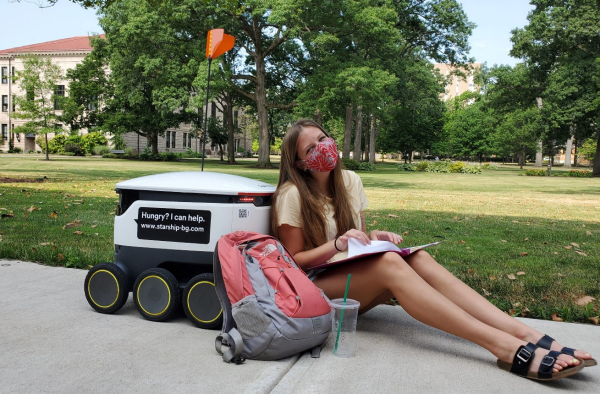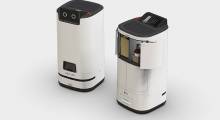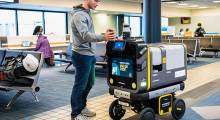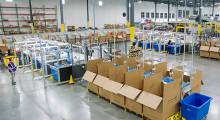Starship Technologies today announced that will begin delivery service on four additional colleges this fall: the University of Illinois in Chicago, the University of Kentucky, the University of Nevada at Reno, and Embry-Riddle Aeronautical University’s campus in Daytona Beach, Fla. The San Francisco-based robot provider said these campuses will join the other locations where Starship robots provide deliveries with its global fleet of more than 1,000 robots.
“We’re excited to welcome such a diverse and exciting roster of schools to our service,” said Alastair Westgarth, CEO of Starship Technologies. “We’ve worked hard to become a trusted and integrated partner on our campus communities, and that hard work has paid off. We are continuing to add new schools every semester, with more to be announced this fall.”
“The students love the robots, and the schools appreciate the ability to offer this service,” he added. “We can’t wait to meet the students at each of these schools and look forward to hiring students on all of the campuses to give them real-world experience working with robots and AI.”
Starship Technologies has designed its zero-emissions robots to deliver food, groceries, and packages locally in minutes. The company said its mobile robots have traveled millions of miles and completed over 1.5 million autonomous deliveries around the world. They drive autonomously but are monitored by humans who can take control at any time.
Starship operates commercially on a daily basis around the world. It added that its robots make more than 80,000 road crossings every day.
Campuses embrace robotic deliveries
College students quickly embraced Starship’s delivery robots when they began service at George Mason University in Virginia in January 2019. The popularity has continued to increase with Starship’s service now available across nearly 20 different campuses in 15 states. Starship also plays a key role in helping ensure laws are in place for the safe operation of personal delivery devices, which are now authorized to operate in more than 50 percent of US states.
The Starship Food Delivery app is available for download on iOS and Android. To get started, users choose from a range of their favorite food or drink items, then drop a pin where they want their delivery to be sent.
They can then watch as the robot makes its journey to them, via an interactive map. Once the robot arrives, they receive an alert, and can then meet and unlock it through the app.
Delivery hours vary at the participating campus restaurants, and payment options include credit and debit cards and the student meal plan. At each campus location, local students are hired and trained to join the Starship team.
“Starship was an essential service for many students during the pandemic,” said Westgarth. “We consistently broke delivery records, even with fewer students on campus. We heard from so many students about how much they appreciated the service, how the robots made their time on campus seem ‘more normal’ and how they helped brighten their moods during a really difficult time.”
Starship helps bring students back
The four new universities are the first in their respective states to offer autonomous on-demand robot delivery service to their campus communities, said Starship Technologies.
The service has already started with an initial set of merchants and hours at University of Nevada, Reno (UNR) and Embry-Riddle and will be fully operational when students return for classes. UNR will have 20 robots providing deliveries for 14 merchants, including Panera Bread, Habit Burger, and Baja Fresh.
Twenty robots will serve Embry-Riddle's campus, with 10 merchants including Starbucks, QDOBA, Flight Cafe, and Legacy Walk Wings Food Truck.
Service will begin at University of Kentucky on Aug. 16 and become fully operational when classes begin a week later. It will start with 20 robots and seven merchants including Starbucks, Subway, and Auntie Anne’s.
Service is expected to begin at the University of Illinois Chicago (UIC) this fall with 25 robots and 11 merchants including Starbucks, Panda Express, and Freshii.
“We see the Starship robots as an important part of safely bringing students back to campus,” said Dean Kennedy, executive director of residential life, housing, and food services at UNR. “Everyone wants to resume in-person classes and be back on campus, so we’re doing everything we can to make sure it’s done responsibly. The robots offer several advantages—they make social distancing easier, they are convenient, the students we have spoken with love this idea, and they continue our heritage of being an innovative campus.”
“I never thought I’d be sharing sidewalks with a robot when I thought about going to college, but they feel right at home with the coming age of innovation and technology,” said Johan Restrepo, a student at Embry-Riddle. “It seems really futuristic yet completely normal at the same time. It’s always fun to see them travelling around campus, and having the option to get food delivered is a huge bonus that my friends and I can’t get enough of!”
Article topics
Email Sign Up

















